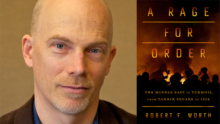Elaine Smith
Presented annually by the Lionel Gelber Foundation in partnership with the Munk School of Global Affairs and Foreign Policy magazine, the Lionel Gelber Prize is a literary award for the world’s best non-fiction book on foreign affairs. Robert Worth is the author of this year’s prize-winning book, A Rage for Order: The Middle East in Turmoil, from Tahrir Square to ISIS. In this work, Worth explores the Arab Spring and its aftermath in five Middle Eastern countries through the eyes of local people. Worth, a veteran New York Times journalist, was based in Baghdad for two years and later, from Beirut, served as the newspaper’s Middle East bureau chief. He has travelled extensively throughout the region.
Tell us how you, a native New Yorker, became interested in the Middle East.
While working on a PhD in American Literature at Princeton University, I became acquainted with graduate students in their Near Eastern studies program; that piqued my interest and I began learning about the Middle East, doing a lot of reading. In 2003, in the aftermath of the Iraq War, when the Times was looking for someone to report from Baghdad, I put my hand up. I stayed three months and I loved it. I was assigned to Baghdad from 2004 to 2006 and I began studying Arabic right away. I was a real latecomer to the area, but I got very passionate about it, and spent my time off travelling the region. In 2006, they offered me the Beirut job, and by that time, I felt invested enough in the region that it was something I wanted to stick with.
What compelled you to write this book?
I wanted to write a book about the region and originally planned to write about Yemen, but it is a very complicated, divided society. I covered the unfolding of the Arab Spring and I was in Cairo in 2013 when government security forces killed 1,000 people who were part of an Islamist protest. That was when I decided to do a book about the whole region, rather than focusing on one country, since something parallel was happening in other countries, too. I had been profiling some people in the region for the New York Times magazine and decided to knit those stories together to show why each country was coming apart.
What impact do you hope your book will have?
I love the Middle East. It is such a different culture, and I enjoyed the feeling of being in a culture that is very family-based, where friendships matter immensely. It’s a more traditional culture, but an intensely social one; so much revolved around sitting and talking to people and drinking tea. I wanted to share that and to humanize the conflicts taking place. I wanted people to empathize with the characters and see how they came to be who they are. I hope that in some way, it causes people to see Muslims as human beings.
What’s next for you? How will winning the Lionel Gelber Prize help you along?
I am still writing for the New York Times magazine about the Middle East and want to continue to watch things unfold, although I am branching out to write about other locales, too. I enjoyed writing the book and I want to do another one. With A Rage for Order, to some extent, I laid the story on a framework of pieces I had all ready had written, with some fresh reporting added. I would like to write a book organically, starting from scratch. The Gelber Prize money will help me travel to places that aren’t part of my assignments and develop good ideas. To come up with ideas, you have to get out there.
Talk about your personal philosophy.
I try to take a realistic approach to life and often push back when people want to change the world. By nature, I’m an observer. I like to be the fly on the wall, rather than the person fighting for a cause.
April 17, 2017
